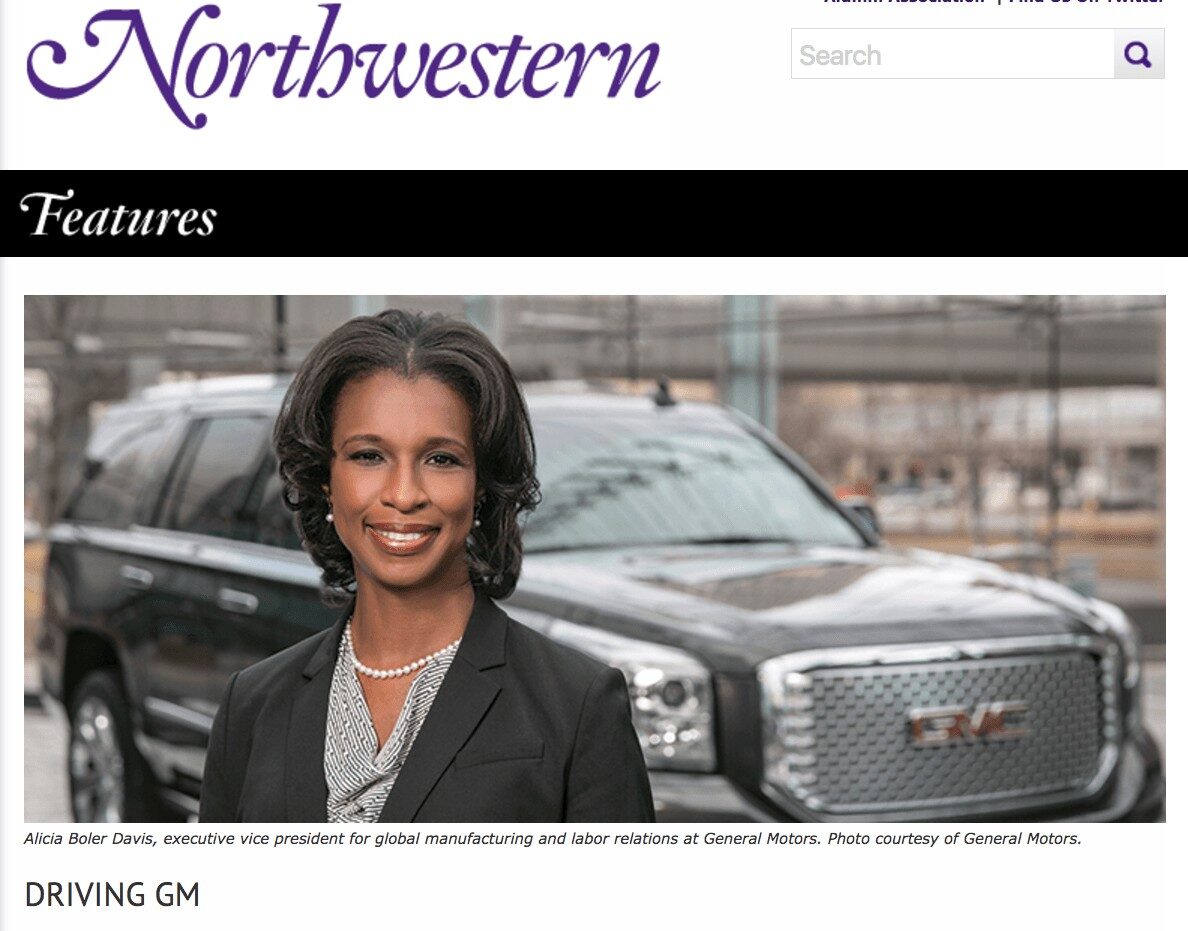I was happy to see an engineer (Chemical Engineering) and a General Motors leader, Alicia Boler Davis, on the cover of the Northwestern University alumni magazine.
See this profile and story:
My wife is an engineer and a business leader in another part of the manufacturing world, so I'm also always happy to see a female executive who is doing well and is helping to change the culture in organizations like GM.
GM's current CEO, Mary Barra, is also an engineer by training and she was also a plant manager during her career path. I wonder what percentage of plant managers are women within GM today? Boler Smith is the first African-American woman to have led a GM plant.
Hear Mark read this post — subscribe to Lean Blog Audio
When I worked at GM from 1995 to 1997, it was VERY male-driven. The only female manager I can remember in my plant was the head of quality. The plant manager, everybody at the level below him, and all of the managers and supervisors I worked with were men. There were many women in the engineering ranks and on the assembly line. But leadership (or what passed for it there) still seemed to be a very male domain.
When I was at GM, it was still the very traditional top-down, command-and-control culture and environment, as I've blogged about many times before. That culture started changing at my plant when we got a new plant manager, a NUMMI-trained leader named Larry Spiegel (listen to my two podcasts with one of his colleagues from NUMMI).
GM was learning that they needed a new approach to leadership. The article about Alicia Boler Davis touches on that in many ways.

Famed auto industry analyst David Cole was quoted as saying:
“The reign of the king-leader is gone. The leader is more like a coach.”
By this, he means that the once-dictatorial executives who crashed the industry have been replaced with consensus-building, team-focused leaders.
And according to those she's led, Boler Davis is a terrific coach.
It's a shift from the leader as “boss” to the leader as a “coach.” Instead of blaming people and yelling at them, we work together.
The king-leader (or queen-leader!) era is hopefully gone in the auto industry.
But what about healthcare in the year 2016?
Do we have “once-dictatorial executives” or “still-dictatorial?”
Are today's healthcare leaders “consensus-building, team-focused leaders” and coaches?
There's a lot to learn from other industries, even if patients are not cars, as they say.
Boler Davis says:
“I think a big part is the people,” she explains, “being able to interact with people, being able to bring people together for a common goal.”
Some talk about “the people side of Lean,” but arguably it's ALL the people side. The “people side of management” is vital, right?
From the article:
“Alicia's got an incredible ability to be on the floor and talk with people who are building our vehicles, know what our issues are and genuinely relate well to the employees,” says Moloney. “She's at ease on the floor, and she's at ease in the corporate boardroom.”
Are today's hospital leaders at ease both in the emergency department and the boardroom?
Speaking of the floor and front-line staff, here's a sidebar from the printed magazine that also appeared online on a separate page.
There's a story about the change in culture that I saw taking place at my GM plant. My first plant manager was the imperial stay-in-the-corner-office type. The new NUMMI plant manager engaged with people on the floor.
“When Bill Boggs first managed General Motors' Detroit-Hamtramck plant, there was a lot of work to be done. The previous plant manager, he says, “sat in the office, pulled everybody into the conference room and beat them up and sent them back out on the floor. He didn't get involved.”

In any setting, as it says in that sidebar, you have to win the hearts and minds of employees.
Again from the main piece:
On the factory floor, there is a constant drive to hit the day's quotas. Boler Davis loves this life because, at the end of the day, “you can see whether or not you're winning.”
That's an old auto industry habit that dies hard. Sure, there's pressure at Toyota to hit their daily production goals. At the old GM, quantity was quite often prioritized over quality (as I wrote about here). At Toyota (and I'd presume at the new GM), safety and quality don't take a backseat to the day's production goal.
I'm glad Boler Davis is helping change GM. There's still so much work to be done in healthcare… we'll keep working at it one day at a time, one year at a time.
On that note… I got a nice email from a blog reader who shared this story:
“I appreciate your steady, continuous work showcasing what real lean is all about. I know the journey is long and feel optimistic that with yourself and others guiding the way; we will someday realize the true potential of a safer, more efficient health system.
Your daily postings remind me of a famous Rabbi; who while standing along the edge of a flowing river noticed the rocks had been worn down by the constant flow of water. He commented that the stream of water was powerful enough to cut through stone only through its daily flow. The same is true of daily study and reflection.”
Change is hard. Sometimes we have to be patient. I'm not always good at that.
Thanks to everybody else who is driving change, whether you're patient or not!
What do you think? Please scroll down (or click) to post a comment. Or please share the post with your thoughts on LinkedIn – and follow me or connect with me there.
Did you like this post? Make sure you don't miss a post or podcast — Subscribe to get notified about posts via email daily or weekly.
Check out my latest book, The Mistakes That Make Us: Cultivating a Culture of Learning and Innovation:









